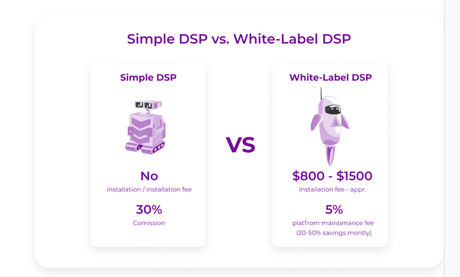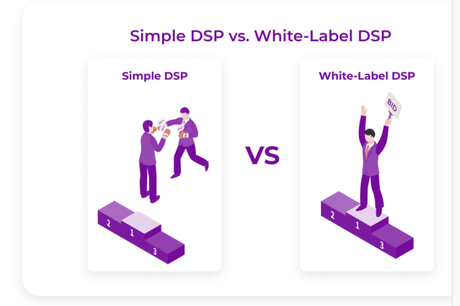Every programmatic advertising business is unique. While some shift their gaze to this market niche because it is increasingly profitable (accounting for 84% of all media-spend ), others are trying to cut their media-budgets and gain more control over internal processes ( according to IAB report 2019 ). Big brands like , Netflix and Kellogg are actively shifting their media-purchasing in-house. They build their own technological systems and open entire programmatic departments to operate them.
At the same time, there're plenty of businesses that cannot afford to build stacks equal to Buyer's. However, this doesn't mean they can't have a technology of their own. If your new year's resolution was to start an advertising business in 2020, the white-label collaboration model appears to be the most reasonable decision that you can make in terms of time and money. Why? Let's discover.
What is white-label and how does it remove business-building headaches?
White Label is a type of partnership between manufacturer and reseller. The manufacturer produces the goods or services (software is especially popular) and other companies purchase it and re-sell it under their own brand and according to individual terms. This way, each partner can focus on areas they specialize best in.
The re-seller can:- Quickly launch a new product without investing too much time in development
- Quickly access the best industry innovations
- Focus on their core competencies
- Promote business as they want (which is not available, e.g, for a franchisee)
- Share their experience with other companies and obtain additional revenue from them
- Grow their expertise and business partnerships
If you decide to build an ad tech platform, white-label can be your best helper. Ad tech industry covers a fairly broad scope of technologies, for both media-buying and media-selling, that you can build with white-label. For instance, if we talk about media-buying, the most popular software that automates an advertiser's workflow is DSP.
DSP solution helps advertisers to manage media-purchases across different channels globally (desktop, mobile, connected TV). White label DSP is the same DSP but repacked, customized and resold by another company.
So, a demand-side platform that's normally used by advertisers for media-buying automation finds a new owner who can resell it as their own and capitalize on it.
There's no need to go the long way and wait until the platform gets built, designed, tested and licensed - the solution is already pre-built and ready for deployment. For this, you don't have to be an expert in every taken area of work, nor do you need to hire a huge staff. Thus, with this kind of technology, everyone can start his/her business, even if they have zero technical knowledge.
What makes white-label DSP affordable and reliable?
Apart from the mentioned human resources and necessary money injections, the new software platform from scratch will also take a long time to build; according to the most humble estimations, somewhere from several months to .
With programmatic, it is even more complicated - after the platform is finished, it has to be plugged into the vast programmatic ecosystem of partners and connected to traffic sources through RTB protocol. It's doable when you have a big team of reliable programmatic professionals by your side, but in the end, only when a solution is time-tested can you guarantee it will be bug-free and robust enough to measure up with that of your competitors.
Cost. Individual project development always costs more than a pre-made technology installation. Normally, you'll have to invest in custom software - from $40,000 and $250,000 . Now, compare it with a white label demand-side platform deployment - from $1000 - $50 000. As time passes and your ad business develops, you'll also have to attract professionals to scale it. Since white-label DSP is typically built on SaaS technology, all updates, new features and capacity enhancements will run on background by the tech team. As soon as they're released, they'll be immediately available in the dashboard.
4 benefits you get starting an ad tech business with white-label DSP
Reduced ad budgets. Now we need to get back to Buyer's example once more because going in-house is what saved the company of the media-buying budget within 6 weeks. How exactly? The company saved up on service commissions normally given to third-party technology providers. If you use simple DSP, it won't charge you an average 30%, and it's ok if you rarely run ad campaigns. However, with a budget of, e.g., ~$32,000 per month, the commission will climb up to $9.600 while ~5% white-label commission or fee will take only $1.600.

No bidding against yourself. Media-buyers prefer to collaborate with different DSP providers at once because it broadens potential reach. Apart from this, DSPs are not all equal - while one company may specialize in narrow traffic types, the other may have preferable business verticals. The white-label DSP platform is already tuned into the ecosystem to maximize the partnership network across geos and verticals globally. The owner can access a global network in a single interface and prevent the problem of bidding against oneself in various auctions.

On-demand integrations. On-demand customization, additional modules and integrations are the main reasons why entrepreneurs choose to build their platforms from scratch. However, certain white-label DSP solutions feature deployment teams that are able to customize pre-built technologies specifically for your business. At any rate, it will be more affordable than building an entirely new thing. Thus, e.g., if you have an agreement with a data partner or SSP, the team can configure connection via API or any other available option.
Rapid market entry. By sharing their technology and experience with other companies, white-label ad tech providers create rapid business-growing opportunities for other entrepreneurs. Within one month, entrepreneurs can launch a high-quality ad tech product that meets best industry standards. Thus, new companies can instantly give their clients access to industry innovations and seize the vacant market niche before their competitors.
To wrap it up
Ad tech is an industry based on innovation and media-buyers, actively tapping into it and hoping to streamline their ad campaigns to the fullest. Some advertisers get satisfied with a set of functions they get using third-party DSP, while others decide to go independent and build their own system tailored specifically to their business. However, for some entrepreneurs, building software from scratch appears to be challenging in terms of money, time and employees.
White-label is a very useful collaboration concept that you should keep in mind if you plan to create a branded DSP technology of your own. This method of partnership does not require investing substantial resources in the creation and development of the product and its maintenance. With white-label solutions, entrepreneurs can focus on their core business competencies while technology providers handle the heavy lifting: building, enhancing and scaling the platform so that it stays profitable and competitive
Author: Irina Kovalenko, Chief Marketing Officer at

